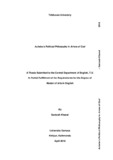Please use this identifier to cite or link to this item:
https://elibrary.tucl.edu.np/handle/123456789/3139Full metadata record
| DC Field | Value | Language |
|---|---|---|
| dc.contributor.author | Khanal, Santosh | |
| dc.date.accessioned | 2018-04-29T10:02:27Z | |
| dc.date.accessioned | 2021-07-23T04:27:02Z | - |
| dc.date.available | 2018-04-29T10:02:27Z | |
| dc.date.available | 2021-07-23T04:27:02Z | - |
| dc.date.issued | 2016 | |
| dc.identifier.uri | http://elibrary.tucl.edu.np/handle/123456789/3139 | - |
| dc.description.abstract | Arrow of God by Chinua Achebe is a political and cultural novel which dramatizes how political power was exercised and colonial rule was legitimized through different strategies during 1920s Nigeria in particular and Africa in general. It highlights the way British people build the infrastructure needed to continue their so- called self imposed project of civilizing and modernizing Nigerian people saving them from the state of barbarism because Europeans take Africans as the antithesis of civilization. Moreover, it accumulates the saga of pains and sufferings, troubles and tribulations, plight and predicament of African people under British rule as well as afterwards. Through this novel, Achebe elucidates his political philosophy that power corrupts people and literature has close nexus with society and can be used as a means of social change. Like his other works, Arrow of God also epitomizes the consequences of colonialism and imperialism in Africa and its growing dependency on Europe and European people for everything thereby bellowing universal appeal to change the course of action in time. | en_US |
| dc.language.iso | en_US | en_US |
| dc.publisher | Central Department of English Kirtipur, Kathmandu | en_US |
| dc.subject | Political science philosophy | en_US |
| dc.subject | Noval | en_US |
| dc.subject | Power(Social science) | en_US |
| dc.title | Achebe’s Political Philosophy in Arrow of God | en_US |
| dc.type | Thesis | en_US |
| Appears in Collections: | English | |
Items in DSpace are protected by copyright, with all rights reserved, unless otherwise indicated.

